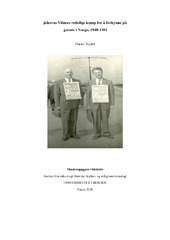Jehovas Vitners rettslige kamp for å forkynne på gatene i Norge, 1948-1951
Master thesis

View/
Date
2020-06-24Metadata
Show full item recordCollections
- Master theses [207]
Abstract
In this thesis I aim to analyze the legal conflicts the Jehovah’s Witnesses had to endure in Norway between 1948 and 1951, due to their proselyting activities. During this time period there were four episodes were their proselyting activities got them in serious trouble. Three of these were dealt with in court. In Fosen two pioneers from the Jehovah’s Witnesses were arrested in January 1948, and later convicted guilty for selling books without a permit from the police. In February 1949 three Witnesses were stopped by the police in Stavanger, for selling The Watchtower. They were given a stern warning by the chief of police. In an evening in November the same year, seven Witnesses were arrested on the street corners in Karl Johans gate in Oslo, for handing out literature to passers without having a permit from the police. They were sentenced in the lower court, but later acquitted by the Supreme Court of Norway. Finally, five Witnesses were charged in Tønsberg for handing out or selling literature on the streets to passers, but they were acquitted by the court. The overall aim of the thesis is to find out why their proselyting activities were problematized by the police, and to what extend the Jehovah’s Witnesses actively used the judicial system against these resistances. I argue that it was the distribution and selling of literature that was problematized by local authorities, and their refusal to apply for a permit. Oslo and Tønsberg had local ordinances which forbade the distribution of certain printed material in public, without a permit from the police. In Fosen they were sentenced for breaking a commercial law. I argue that the Witnesses in Oslo and Tønsberg used the judicial system actively to overrule the police use of these ordinances, and that they succeeded in doing so by winning in Supreme Court. Cases like these were not unique in Norway. In many countries the Jehovah’s Witnesses experienced problems with local authorities because of their proselyting activities. In the United States of America, the Watchtower headquarters employed a comprehensive legal strategy to combat local ordinances that hindered their proselyting activities. I argue in my thesis that the Witnesses in Oslo and Tønsberg employed this strategy, and that the goal here was the same as in the United States: To fight for their right to preach on their terms, and without interference from local authority.